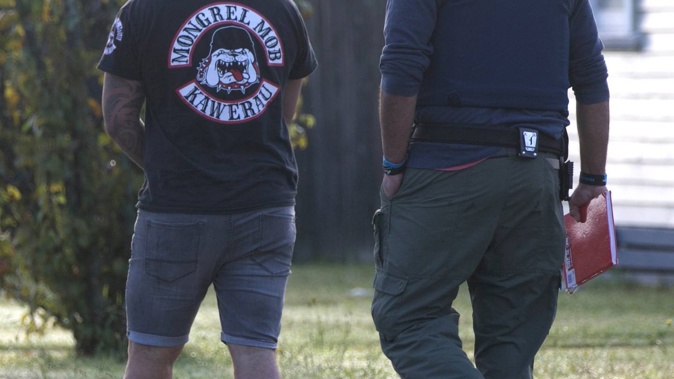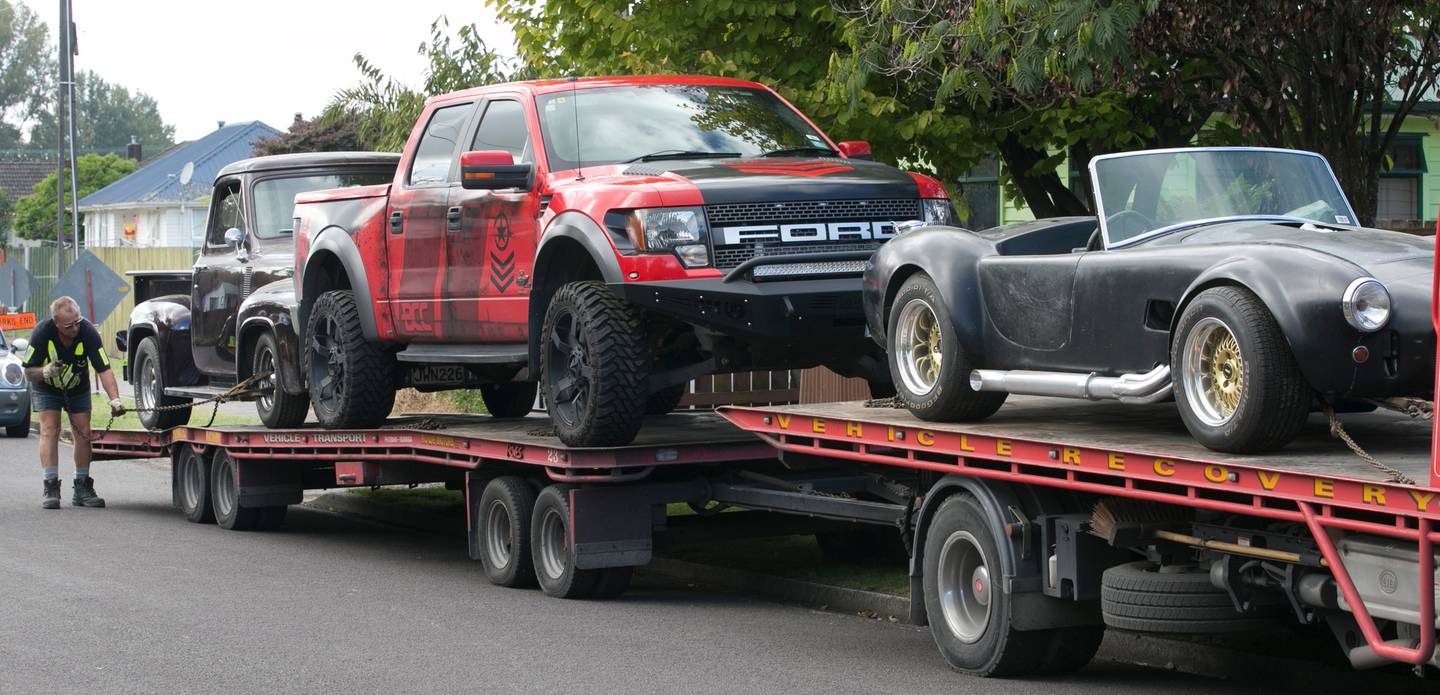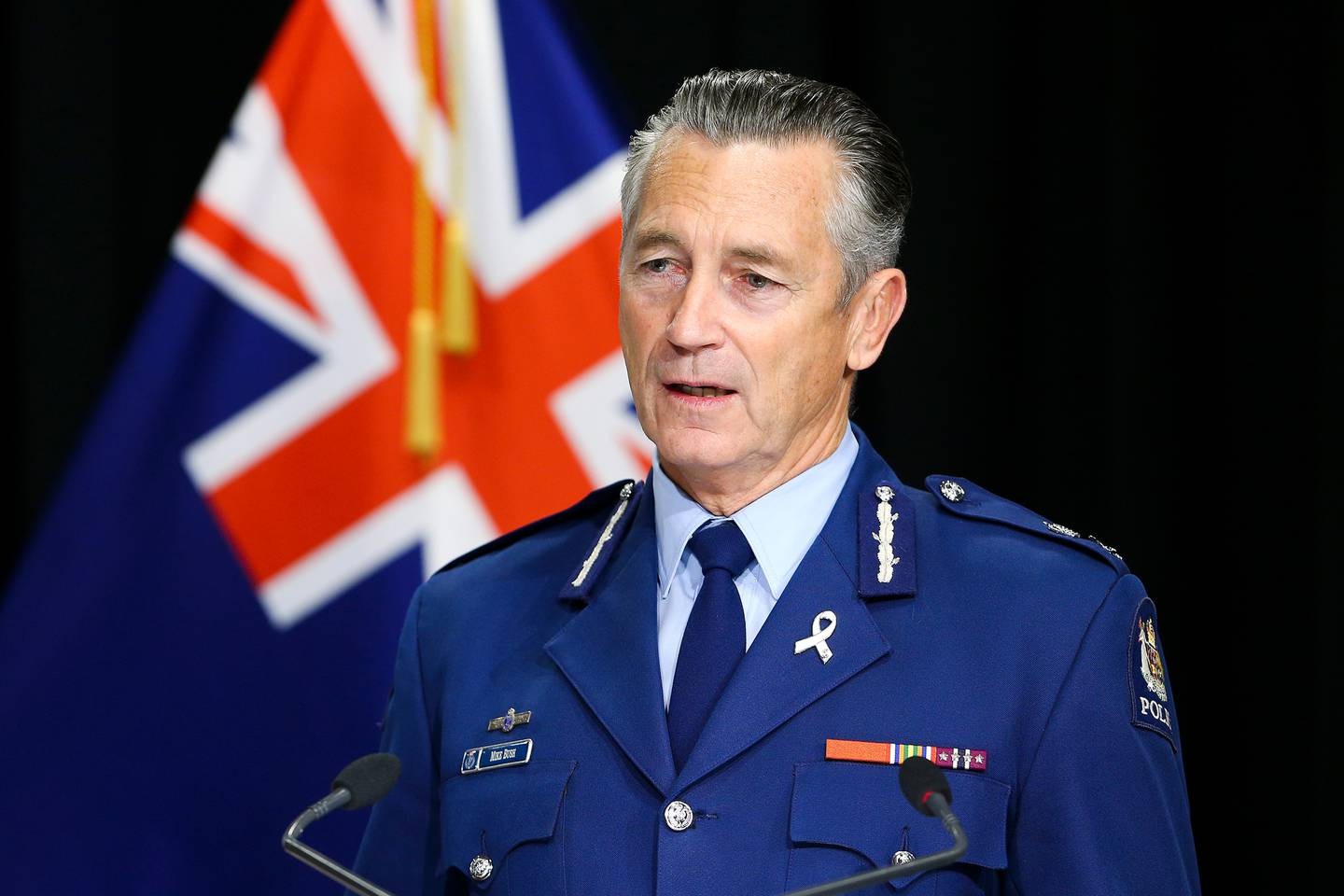
In an exclusive extract from his new book, Gangster’s Paradise, Herald reporter Jared Savage goes inside the covert police investigation that loosened the Mongrel Mob’s grip on a small rural town.
The biggest problem in Kawerau drove past the police station every day.
The Ford F-150 Raptor – with its 6.2 litre V8 engine, 411 horsepower, oversized guards and jacked-up suspension – was the most powerful ute on the market. Even a second-hand Raptor was selling for around $100,000. It was admiringly described as the “Ferrari of pickup trucks” and, just like a Ferrari, the Raptor of Kawerau was red.
Red, and black: the colours of the Mongrel Mob. Sitting at his desk at the Kawerau police station, a frustrated senior police officer could only watch as neighbourhood kids waved with excitement at the truck with the personalised plate XRKUTE.
To the kids, the ute was a symbol of success. To the cop, it was a symbol of everything that had gone wrong in Kawerau. The little town in the eastern Bay of Plenty, just a 45-minute drive east of Rotorua past the holiday homes dotted along the edges of lakes Rotoma and Rotoiti, was once a prosperous industrial hub.
Back in the 1960s, the Caxton and Tasman paper mills employed about 2000 people and produced more than 20 per cent of the country’s exports. Money was put in the back pockets of the local families, who worked hard but enjoyed a comfortable middle-class lifestyle. Along came the scythe of Rogernomics.

The Ford Raptor and other vehicles seized at the end of Operation Notus in Kawerau in March 2018. Photo / Alan Gibson
The economic reforms of the Fourth Labour Government in the 1980s opened up the New Zealand economy to overseas competition. It cut export subsidies, which made importing overseas products more attractive.
It was a seismic shift that led to thousands of people losing their jobs. The consequences for Kawerau were devastating. Homes were emptied as people left town in search of work, the school roll was slashed, sports clubs shut down, businesses closed. By 2010, more than 60 per cent of the town’s population had gone on to some form of social welfare benefit.
Like so many other provincial towns in New Zealand, Kawerau had gone from prosperous to poor in the space of a generation. It isn’t just power that loves a vacuum: drugs, too, rush in to fill a void. The change in fortunes saw many turn to whatever intoxicants were available. It was a road that led to the ultimate intoxicant: methamphetamine.
Methamphetamine use began in the cities. Once upon a time, in the late 1990s and early 2000s when the drug first blew people’s minds, it was the fashionable drug of choice for white-collar professionals, and the rich and vaguely famous – as well as the down and out. Meth doesn’t discriminate.
Over the following two decades, as politicians failed to get a grip on the growing crisis, there was a slow but inexorable shift from the cities to poorer rural communities. No one in Parliament seemed to notice. The problem was out of sight, out of mind for the country’s decision-makers in Wellington.
It wasn’t like that in the towns, though. By 2016, the frustrated Kawerau constable had been a frontline police officer in the eastern Bay of Plenty for 25 years and had watched the evolution of the methamphetamine trade unfold in front of him.
He experienced first-hand the devastation caused in the community he grew up in. He also knew who was behind it: Frank Amadeus Milosevic, the owner of a fairly noticeable red-and-black Ford F-150 Raptor with the licence plate XRKUTE, and who also happened to be president of the Kawerau chapter of the Mighty Mongrel Mob.
The Mongrel Mob is New Zealand’s largest gang. It has an estimated 2500 members, about twice the size of Black Power, the Mob’s fiercest rival. Their beginnings appear to be traced back to Hawke’s Bay in the late 1960s. Most members were Māori and poor, raised in broken homes or taken away into state care, where they were often abused.
These so-called “boys’ homes” were essentially prisons and, for many, became the first stop in a life behind a barbed-wire fence. No wonder they lashed out. The Mongrel Mob adopted the Nazi swastika and “Sieg Heil” salute as their own – not because the mostly Māori or Pasifika Mobsters had any love for white supremacists, but because these things were offensive, a calculated “f*** you” to society.
By the 1980s, the Mongrel Mob had started to spread across the country and forge a reputation for violence. Their lawlessness and extreme anti-social behaviour was a state of mind that members referred to as “Mongrelism”, and it was a psyche that would lead to some of New Zealand’s most notorious acts of physical and sexual violence.
The Mob spread far and wide across New Zealand, with about 30 or so disparate chapters or factions loosely bound together under the banner of the British bulldog on the patch. One of those chapters was Kawerau.
The town was considered “red” – or Mongrel Mob territory – along with most of the eastern Bay of Plenty, except for a “blue” enemy stronghold of Black Power in nearby Whakatane. The environment of growing unemployment and poverty was a breeding ground for gang recruitment, as well as a captive market for those wanting to escape by consuming methamphetamine.
The toxic combination meant Kawerau came to be in the grip of the Mob. Frank Milosevic was the unofficial mayor, and there was nothing a long-serving police officer in the town could do about it. He’s now left the police and doesn’t want to be identified.
But his thwarted efforts to tackle the Mongrel Mob often made him feel like an outnumbered Sheriff in the Wild West, trying to clean up a town rotten to the core. Armed with a search warrant, the Sheriff could kick down the door and arrest one of Milosevic’s minions; perhaps seize some meth, cash or firearms. But that only went so far. The true challenge was to unravel the entire network and prove Milosevic was the one pulling the strings. Gathering that kind of evidence, though, could be attempted only with a long-term covert investigation.
Such investigations require intercepting conversations, either on phones or listening devices hidden in cars or homes, physical surveillance and sometimes even undercover officers posing as drug dealers. They are expensive and resource intensive, often continuing for months on end without immediate success. It was far beyond the capabilities of the Kawerau police station.
The Sheriff tried to attract the interest of the Bay of Plenty organised crime squad, comprised of five detectives based in Rotorua, but they always seemed to be tied up with other work. Frustrated by the lack of backup, the Sheriff went straight to the top with a plea for help. On 8 December 2016, he sent a long email to then-Police Commissioner Mike Bush.

The Sheriff wrote, “I have just read your comments regarding yet another successful metropolitan operation targeting meth dealers. I have read comments regarding similar successes in other metropolitan centres around the country. I could be wrong but I am yet to read a success story originating from the provinces, in particular the very rural areas. ‘I can assure you the meth problem in these areas is every bit as bad as the cities and it is my belief it will surpass the metropolitan areas soon. The reason [is the] lack of policing resources in the provinces and the gangs knowing this to be the case. I have worked in the Eastern Bay for nearly 25 years. I have an intimate knowledge of the organised crime scene here which is dominated by the Mongrel Mob. In your intranet article, you talk of the harm meth causes to society. In small communities that harm is devastating. In my town of 5000, I have criminal acts such as burglary and violence perpetrated on victims by those caught up in the meth trade. Through my [criminal informant] network I have entered reports detailing standover tactics with firearms, violent taxing of property and stabbings. At the other end of the scale, I have unemployed gang members driving $100,000 vehicles, purchasing real estate, holiday baches, renovating houses, buying classic motor vehicles, riding expensive motorbikes, going fishing in their expensive boats and jet skis.”
The Sheriff went on to describe his own efforts to investigate the gang himself and his unsuccessful attempts to get support from the Bay of Plenty organised crime squad: “As I see it, big success stories from the metropolitan areas printed in newspapers are being heralded as victory over organised crime and that police are on top of things.
Sadly the reality in the provinces is the opposite and unemployed gang members are making hundreds of thousands of dollars and meth is easier to buy than a pint of milk.”
Bush replied quickly to say work was underway with the previous and current police ministers (Paula Bennett had recently replaced Judith Collins in the role) relating to the increasing demands on frontline staff.
He wrote, “Whilst I’m not in a position to say anything further, be assured that we understand the challenges facing staff and are working hard to address them.”
Bush then asked Bay of Plenty district commander Andy McGregor to address the specific concerns raised by the Sheriff. The task fell in turn to senior detectives in the region. But no one was able to spare any staff. The eastern CIB was struggling with the fallout of Operation Waiotahi, ironically an investigation into a series of shootings and violent incidents between the Kawerau Mongrel Mob and Black Power in Whakatane. The organised crime squad in Rotorua was still heavily committed to Operation Centurion, which was a long-term investigation into Head Hunters gang member Stacy Paora. While Paora had been arrested in December 2016, the team still had a lot of work to do around preparing the file for court and following the money trail.
Detectives had also been seconded to work on a spate of homicide inquiries across the region. Another avenue suggested was to work up a profile of Milosevic’s wealth to see whether the Asset Recovery Unit would investigate. The ARU uses the Criminal Proceeds Recovery Act to restrain suspected ill-gotten gains, often of drug dealers, but the threshold for action can be high. ‘Unfortunately, a gang member in Kawerau with $100,000 of assets doesn’t stack up against an Asian drug dealer from elsewhere with a million dollars,’ wrote Detective Senior Sergeant John Wilson. “These things are all relative.”
With no progress made in five months, the Sheriff forwarded the entire email chain to the Police Commissioner in a new message. “I get the distinct impression that the rural areas will never be an organised crime target,” said the Sheriff in May 2017. “I already have the intel and warrants prepared. That’s not the hard part. The difficulty is in proving the course of business. Without going live on phones, using a [undercover officer] or a surveillance team, I am back to square one.”
The Sheriff finished the email to Bush with an anecdote about the harm methamphetamine was causing in Kawerau. He had recently arrested a patched Mongrel Mob member, high on methamphetamine, who had fractured the eye socket of a 67-year-old woman in a home invasion. ‘She lay unconscious for 12 hours before being discovered. He stole her purse.”
Bush replied in 39 minutes to say Deputy Commissioner Viv Rickard would give the matter his attention, with the support of the National Operations Group led by Deputy Commissioner Mike Clement. “It is my view that we should not let opportunities to disrupt organised crime go past us,” Bush wrote. And that’s how the job landed on the desk of Detective Sergeant John Sowter, a veteran investigator in the National Organised Crime Group (NOCG) based in Auckland.
Take your Radio, Podcasts and Music with you









